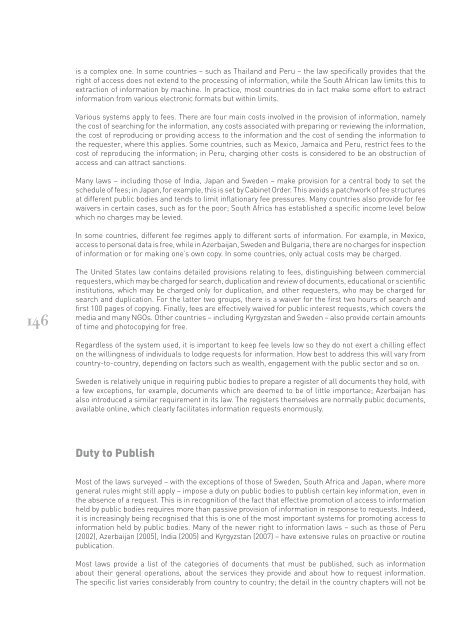Freedom of Information: A Comparative Legal Survey - Federation of ...
Freedom of Information: A Comparative Legal Survey - Federation of ...
Freedom of Information: A Comparative Legal Survey - Federation of ...
Create successful ePaper yourself
Turn your PDF publications into a flip-book with our unique Google optimized e-Paper software.
146<br />
is a complex one. In some countries – such as Thailand and Peru – the law specifi cally provides that the<br />
right <strong>of</strong> access does not extend to the processing <strong>of</strong> information, while the South African law limits this to<br />
extraction <strong>of</strong> information by machine. In practice, most countries do in fact make some effort to extract<br />
information from various electronic formats but within limits.<br />
Various systems apply to fees. There are four main costs involved in the provision <strong>of</strong> information, namely<br />
the cost <strong>of</strong> searching for the information, any costs associated with preparing or reviewing the information,<br />
the cost <strong>of</strong> reproducing or providing access to the information and the cost <strong>of</strong> sending the information to<br />
the requester, where this applies. Some countries, such as Mexico, Jamaica and Peru, restrict fees to the<br />
cost <strong>of</strong> reproducing the information; in Peru, charging other costs is considered to be an obstruction <strong>of</strong><br />
access and can attract sanctions.<br />
Many laws – including those <strong>of</strong> India, Japan and Sweden – make provision for a central body to set the<br />
schedule <strong>of</strong> fees; in Japan, for example, this is set by Cabinet Order. This avoids a patchwork <strong>of</strong> fee structures<br />
at different public bodies and tends to limit infl ationary fee pressures. Many countries also provide for fee<br />
waivers in certain cases, such as for the poor; South Africa has established a specifi c income level below<br />
which no charges may be levied.<br />
In some countries, different fee regimes apply to different sorts <strong>of</strong> information. For example, in Mexico,<br />
access to personal data is free, while in Azerbaijan, Sweden and Bulgaria, there are no charges for inspection<br />
<strong>of</strong> information or for making one’s own copy. In some countries, only actual costs may be charged.<br />
The United States law contains detailed provisions relating to fees, distinguishing between commercial<br />
requesters, which may be charged for search, duplication and review <strong>of</strong> documents, educational or scientifi c<br />
institutions, which may be charged only for duplication, and other requesters, who may be charged for<br />
search and duplication. For the latter two groups, there is a waiver for the fi rst two hours <strong>of</strong> search and<br />
fi rst 100 pages <strong>of</strong> copying. Finally, fees are effectively waived for public interest requests, which covers the<br />
media and many NGOs. Other countries – including Kyrgyzstan and Sweden – also provide certain amounts<br />
<strong>of</strong> time and photocopying for free.<br />
Regardless <strong>of</strong> the system used, it is important to keep fee levels low so they do not exert a chilling effect<br />
on the willingness <strong>of</strong> individuals to lodge requests for information. How best to address this will vary from<br />
country-to-country, depending on factors such as wealth, engagement with the public sector and so on.<br />
Sweden is relatively unique in requiring public bodies to prepare a register <strong>of</strong> all documents they hold, with<br />
a few exceptions, for example, documents which are deemed to be <strong>of</strong> little importance; Azerbaijan has<br />
also introduced a similar requirement in its law. The registers themselves are normally public documents,<br />
available online, which clearly facilitates information requests enormously.<br />
Duty to Publish<br />
Most <strong>of</strong> the laws surveyed – with the exceptions <strong>of</strong> those <strong>of</strong> Sweden, South Africa and Japan, where more<br />
general rules might still apply – impose a duty on public bodies to publish certain key information, even in<br />
the absence <strong>of</strong> a request. This is in recognition <strong>of</strong> the fact that effective promotion <strong>of</strong> access to information<br />
held by public bodies requires more than passive provision <strong>of</strong> information in response to requests. Indeed,<br />
it is increasingly being recognised that this is one <strong>of</strong> the most important systems for promoting access to<br />
information held by public bodies. Many <strong>of</strong> the newer right to information laws – such as those <strong>of</strong> Peru<br />
(2002), Azerbaijan (2005), India (2005) and Kyrgyzstan (2007) – have extensive rules on proactive or routine<br />
publication.<br />
Most laws provide a list <strong>of</strong> the categories <strong>of</strong> documents that must be published, such as information<br />
about their general operations, about the services they provide and about how to request information.<br />
The specifi c list varies considerably from country to country; the detail in the country chapters will not be
















